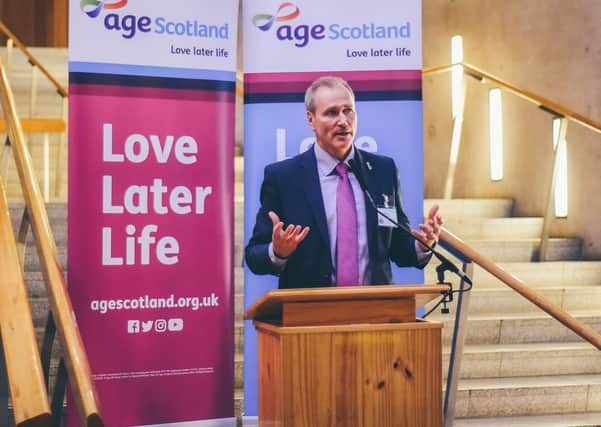Older people face a second epidemic this winter: isolation – Brian Sloan


‘I haven’t spoken to another person in over a week.’ ‘My life isn’t worth living any more.’
These are some of the heart-breaking calls our Age Scotland helpline advisors have taken from older people across Scotland.
Advertisement
Hide AdAdvertisement
Hide AdWhen Covid-19 restrictions first came in, we expected a huge surge in demand for information and practical help.
Six months later, the demand is still there. But the nature of calls has changed. Older people are feeling increasingly lonely, isolated, and desperate. Many simply want to hear a friendly voice, instead of silence or their television.
The longer the pandemic continues, the greater the toll on our mental health and wellbeing. This is especially true for those living alone, carers, and the more vulnerable. They are feeling anxious and cut off from family and friends, with social activities indefinitely on hold.
While restrictions can save lives, they certainly don’t make life easier.
Care home residents have already borne the brunt of this pandemic. As well as the devastating death toll, far too many have gone months with minimal, if any, contact with loved ones.
As winter approaches, this can be an especially lonely time of year. Last year, around 100,000 older people in Scotland ate Christmas dinner alone. Around 200,000 regularly go half a week or more without speaking to someone.
Many more will be alone this year, while community lunches and festivities are cancelled. As cold weather keeps us indoors, garden and doorstep meetings will be restricted.
Today we marked the UN International Day of Older Persons, usually a chance to celebrate ageing and the contribution that older people make to society.
Advertisement
Hide AdAdvertisement
Hide AdBut this year’s theme focused on how pandemics change the way we address ageing and the disproportionate impact on older people’s health.
Now it’s clear we’re in this for the long haul, we need an action plan to ensure support is there for everyone who needs it. While the shielding programme has ended, many still need help getting food, essential supplies and medical treatment.
From greater access to testing to effective supplies of PPE for carers, we must put measures in place to protect the most vulnerable. Our care homes and hospitals must be as safe as they possibly can be, while not cutting off the outside world. Visits from family and friends (face-to-face and indoors) are vital to residents’ well-being.
At the same time, we must protect our own and others’ mental health. In the spring, we saw an incredible outpouring of support, with volunteers nationwide helping with food and prescription delivery, or just a friendly knock on the door. Older people themselves are often at the forefront of these efforts. We’ve been inspired by our groups reaching out in innovative ways. From delivering Friday night fish suppers in the Highlands to afternoon teas in the Borders they have been finding ways to brighten someone’s day. While many are still unfamiliar with technology, that is starting to change. Laptops, tablets, and training to use them help people stay active at home, join arts and music sessions, or just have a blether with friends. There’s nothing like the smile on a grandmother’s face when she was able to see a grandchild living overseas on Zoom for the first time. There’s no doubt winter is set to be long and difficult — no matter our age. But we can all reach out to those around us. A phone call, card, or doorstep chat can make a huge difference and ensure no one goes through this alone. Call Age Scotland’s Friendship line on 0800 12 44 222, Monday to Friday 9am to 5pm. www.age.scot/friendship website.
Brian Sloan, chief executive, of Age Scotland
Comments
Want to join the conversation? Please or to comment on this article.